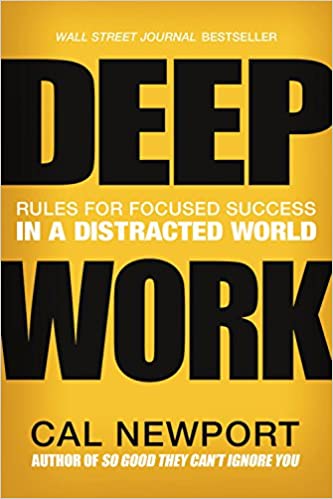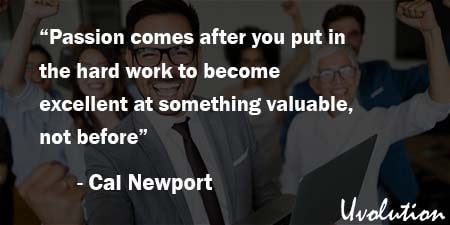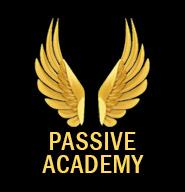Deep Work by Cal Newport
The Book in 1 Sentences
Deep Work: Rules for Focused Success in a Distracted World
“Two Core Abilities for Thriving in the New Economy
1. The ability to quickly master hard things.
2. The ability to produce at an elite level, in terms of both quality and speed.”
And that can be done through Deep Work.
5 BIG Ideas
1. You get better at a skill as you develop more myelin around the relevant neurons.
2. FOCUS (Deep Work) = More myelin around the relevant neurons = Be GREAT at this skill.
3. “High-Quality Work Produced = (Time Spent) x (Intensity of Focus)”
4. People experiencing attention residue after switching tasks are likely to demonstrate poor performance on that next task.
5. ‘The more you try to do, the less you actually accomplish.’
Deep Work Summary
“The Deep Work Hypothesis: The ability to perform deep work is becoming increasingly rare at exactly the same time it is becoming increasingly valuable in our economy. As a consequence, the few who cultivate this skill, and then make it the core of their working life, will thrive.
The book has two goals, pursued in two parts. The first, tackled in Part 1, is to convince you that the deep work hypothesis is true. The second, tackled in Part 2, is to teach you how to take advantage of this reality by training your brain and transforming your work habits to place deep work at the core of your professional life.” ~ Cal Newport
1. Deep Work Vs Shallow Work
“Deep Work: Professional activities performed in a state of distraction-free concentration that push your cognitive capabilities to their limit. These efforts create new value, improve your skill, and are hard to replicate.
Deep work is necessary to wring every last drop of value out of your current intellectual capacity. We now know from decades of research in both psychology and neuroscience that the state of mental strain that accompanies deep work is also necessary to improve your abilities.”
On the other hand:
“Shallow Work: Noncognitively demanding, logistical-style tasks, often performed while distracted. These efforts tend to not create much new value in the world and are easy to replicate.
In an age of network tools, in other words, knowledge workers increasingly replace deep work with the shallow alternative—constantly sending and receiving e-mail messages like human network routers, with frequent breaks for quick hits of distraction.”
2. Deep Work = Myelin --> Greatness
“To understand the role of myelin in improvement, keep in mind that skills, be they intellectual or physical, eventually reduce down to brain circuits. This new science of performance argues that you get better at a skill as you develop more myelin around the relevant neurons, allowing the corresponding circuit to fire more effortlessly and effectively. To be great at something is to be well myelinated.
This understanding is important because it provides a neurological foundation for why deliberate practice works. By focusing intensely on a specific skill, you’re forcing the specific relevant circuit to fire, again and again, in isolation.
This repetitive use of a specific circuit triggers cells called oligodendrocytes to begin wrapping layers of myelin around the neurons in the circuits—effectively cementing the skill.
The reason, therefore, why it’s important to focus intensely on the task at hand while avoiding distraction is because this is the only way to isolate the relevant neural circuit enough to trigger useful myelination.”
Remember that: FOCUS (Deep Work) = More myelin around the relevant neurons = Be GREAT at this skill
3. Multi-tasking = Attention Residue
“The problem this research identifies with this work strategy is that when you switch from some Task A to another Task B, your attention doesn’t immediately follow—a residue of your attention remains stuck thinking about the original task. ... ‘People experiencing attention residue after switching tasks are likely to demonstrate poor performance on that next task,’ and the more intense the residue, the worse the performance.
The concept of attention residue helps explain why the intensity formula is true and therefore explains Grant’s productivity. By working on a single hard task for a long time without switching, Grant minimizes the negative impact of attention residue from his obligations, allowing him to maximize performance on this one task.”
Moving from one task to another leaves a part of our attention focused on the last task. Which Cal calls attention residue, and that diminishes our capacity to fully focus.
Cal also says: “To produce at your peak level you need to work for extended periods with full concentration on a single task free from distraction. Put another way, the type of work that optimizes performance is deep work.”
Remember this formula: “High-Quality Work Produced = (Time Spent) x (Intensity of Focus)”
4. The Four Rules of Deep Work
“Rule #1: Work Deeply
Rule #2: Embrace Boredom
Rule #3: Quit Social Media
Rule #4: Drain the Shallows”
After establishing the *why* of Deep Work in Part 1 of the book, Cal moves into the practical HOW. Those are the four rules. Each has its own chapter with practical stories/implementation tips. (Get you copy of the book to learn more about them)
5. Deep Work Routines
“That brings me to the motivating idea behind the strategies that follow: The key to developing a deep work habit is to move beyond good intentions and add routines and rituals to your working life designed to minimize the amount of your limited willpower necessary to transition into and maintain a state of unbroken concentration.
If you suddenly decide, for example, in the middle of a distracted afternoon spent Web browsing, to switch your attention to a cognitively demanding task, you’ll draw heavily from your finite willpower to wrest your attention away from the online shininess.
Such attempts will therefore frequently fail. On the other hand, if you deployed smart routines and rituals—perhaps a set time and quiet location used for your deep tasks each afternoon—you’d require much less willpower to start and keep going. In the long run, you’d therefore succeed with these deep efforts far more often.”
6. Focus on Wildly Important Goals
“As the authors of The 4 Disciplines of Execution explain, ‘The more you try to do, the less you actually accomplish.’ They elaborate that execution should be aimed at a small number of ‘wildly important goals.’ This simplicity will help focus an organization’s energy to a sufficient intensity to ignite real results.
For an individual focused on deep work, the implication is that you should identify a small number of ambitious outcomes to pursue with your deep work hours. The general exhortation to ‘spend more time working deeply’ doesn’t spark a lot of enthusiasm.
In a 2014 column titled, ‘The Art of Focus,’ David Brooks endorsed this approach of letting ambitious goals drive focused behavior, explaining: ‘If you want to win the war for attention, don’t try to say ‘no’ to the trivial distractions you find on the information smorgasborg; try to say ‘yes’ to the subject that arouses a terrifying longing, and let the terrifying longing crowd out everything else.’”
Having something you really enjoy doing that have a wildly positive impact on your life makes it easier for you to say No to shallow distractions…
So, think about your #1 wildly important goal and write it down.
And remember that: “Don’t take breaks from distraction. Instead take breaks from focus.”
7. Shut Down Work Thinking Completely
“At the end of the workday, shut down your consideration of work issues until the next morning —no after-dinner e-mail check, no mental replays of conversations, and no scheming about how you’ll handle an upcoming challenge; shut down work thinking completely. If you need more time, then extend your workday, but once you shut down, your mind must be left free. ...
Decades of work from multiple different subfields within psychology all point toward the conclusion that regularly resting your brain improves the quality of your deep work. When you work, work hard. When you’re done, be done.
Your average e-mail response time might suffer some, but you’ll more than make up for this with the sheer volume of truly important work produced during the day by your refreshed ability to dive deeper than your exhausted peers.”
After this level of deep work, one should rest and shut down completely!
Cal walks us through his personal end of the day ritual in which he basically does one final check of email to make sure he’s handled anything that’s urgent, looks over what was left undone and plans some time the next day to complete it then, as he turns off his computer for the night, he says to himself, “Shut-down complete!”
8. The Deep Life
“The deep life, of course, is not for everybody. It requires hard work and drastic changes to your habits. For many, there’s a comfort in the artificial busyness of rapid e-mail messaging and social media posturing, while the deep life demands that you leave much of that behind.
There’s also an uneasiness that surrounds any effort to produce the best things you’re possible of producing, as this forces you to confront the possibility that your best is not (yet) that good. It’s safer to comment on our culture than to step into the Rooseveltian ring and attempt to wrestle it into something better.”
Are you willing to do the hard work and live the deep life?! 🙂
That was my QUICK Deep Work summary. If you’re interested, get your copy. There is a HUGE amount of wisdom and life-changing ideas in this book, and we’ve only touched on a tiny bit of it.
Buy The Book: Deep Work by Cal Newport

GET Blinkist 7 Days FREE Trial
3000+ Book Summaries
(Audio and Text)





